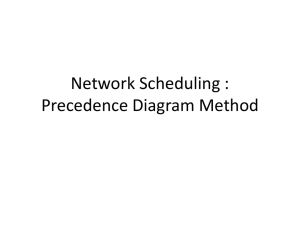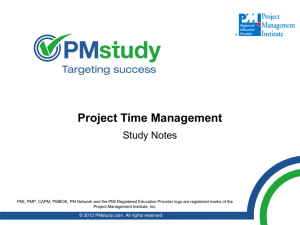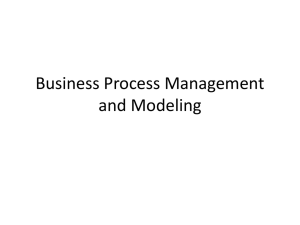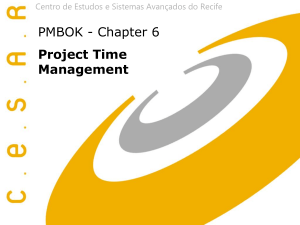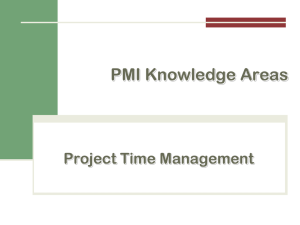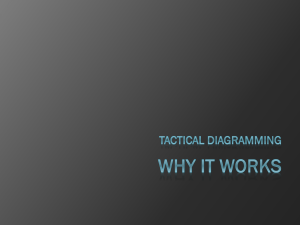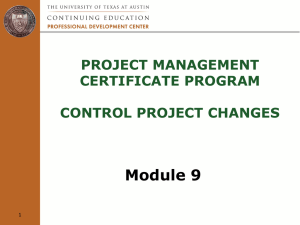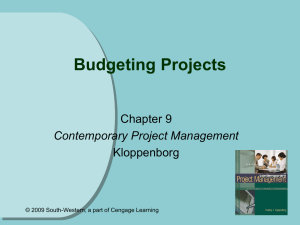Module 6: Defining Project Schedule
advertisement
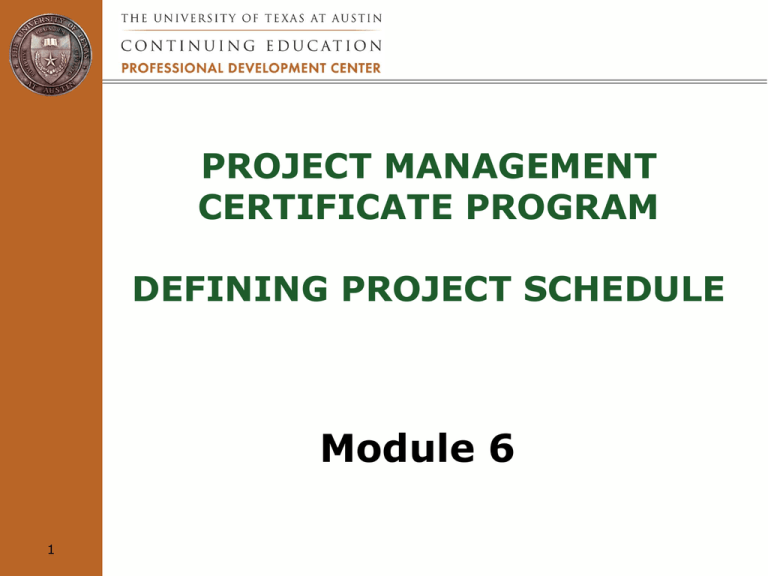
PROJECT MANAGEMENT CERTIFICATE PROGRAM DEFINING PROJECT SCHEDULE Module 6 1 2 Module Objectives By module end, you will be able to: • Understand how to define the schedule for a project • Understand what processes are used in project scheduling • Understand the tools and documentation required to schedule a project 3 Plan Project - Schedule Plan Project - Schedule is performed to develop the project schedule 4 • Project Manager will plan schedule parameters • The primary purpose is to determine the basic project schedule definitions and baselines • This lesson focuses on the Schedule components of the planning cycle Plan Project - Schedule Key Tasks 5 • Perform further breakdown of the WBS • Apply dependencies to sequence activities • Estimate resource and time durations for activities • Determine the appropriate human resources • Compile all project activities into a schedule Plan Project - Schedule 6 This module is a continuation of Plan Project. We will focus on the following processes: • Define Activities (Time) • Sequence Activities (Time) • Estimate Activity Resources (Time) • Plan Human Resources (HR, used with Time) • Estimate Activity Durations (Time) • Develop Schedule (Time) Define Activities • Creates the detailed list of activities or tasks to be completed on the project. This is done by breaking the WBS down into activities • The Activity List is intended to detail all of the project work (scope) • The primary method used to create the activity list is decomposition 7 Define Activities This process specifically identifies all schedule activities Tools and Techniques Inputs Scope Baseline Enterprise Environmental Factors Organizational Process Assets 8 Decomposition Rolling Wave Planning Templates Expert Judgment Outputs Activity List Activity Attributes Milestone List Define Activities • Think about the practical application of this process : • • • • 9 Process Documents Document Templates Process Tasks Think About It Exercise MUST KNOW CONCEPTS 10 Sequence Activities • Relationships between activities must be identified and documented in some form of Network Logic Diagram. This is what activity sequencing is all about. • Project Network Logic Diagrams are often, though not correctly, referred to as PERT Charts. 11 Sequence Activities This process indentifies and documents dependencies among schedule activities Inputs Activity List Activity Attributes Milestone List Project Scope Tools and Techniques Organizational Process (PDM) Dependency Determination Applying Leads and Lags Assets Schedule Network Templates 12 Diagramming Method Statement Precedence Outputs Project Schedule Network Diagrams Project Document Updates Sequence Activities • Intertask Dependency Types: – Mandatory, based on the nature of the work – Discretionary, established by the project team – External, based on the relationship between project and non-project activities 13 Precedence Relationships • Finish-to-Start: the “from” activity must finish before the “to” activity can start • Finish-to-Finish: the “from” activity must finish before the “to” activity can finish • Start-to-Start: the “from” activity must start before the “to” activity can start • Start-to-Finish: the “from” activity must start before the “to” activity can finish 14 Example - Precedence In MSP 15 Sequence Activities •Precedence Diagramming •Nodes show tasks, arrows indicate dependencies F A C Start D E Finish B G 16 Sequence Activities • Think about the practical application of this process: • Process Documents • Document Templates • Process Tasks • Think About It Exercise 17 MUST KNOW CONCEPTS 18 Sequence Activities Additional Diagram Exercises 19 Sequence Activities– manual diagramming techniques • Precedence Diagramming • Nodes show tasks, arrows indicate dependencies Task A Task B Task C Start Finish Task D 20 Task E Task F Sequence Activities– manual diagramming techniques • Arrow Diagramming • Arrows show tasks, nodes indicate dependencies • This shows an arrow diagram – this is no longer on the PMP Exam B A C Start Finish D F E 21 Sequence Activities– manual diagramming techniques • Flowchart-sometimes called “GERT” • Graphical Evaluation Review Technique – also no longer on PMP Exam • Nodes show tasks, arrows indicate dependencies A B C Start End D E Decision 22 F Determine the Critical Path and Duration 23 Critical Path is: Start—A—F—G—H—C—End 24 From this diagram, determine the project duration and critical path. A3 C3 D2 Start End B9 25 E4 From this description, draw a diagram to determine the project duration and critical path Activity Duration Predecessor 26 A B C D E F G 3 3 2 9 4 3 3 Start A B,D Start D E C, F Determine the project duration and critical path A3 D9 27 B3 E4 C2 F3 Act Dur. Pred. A 3 Start B 3 A C 2 B,D D 9 Start E 4 D F 3 E G 3 C, F G3 Determine the project duration and critical path. Start A-3 B-3 Dur. Pred. A 3 Start B 3 A C 2 B,D D 9 Start E 4 D F 3 E G 3 C, F C-2 D-9 G-3 E-4 28 Act F-3 End . Determine the project duration and critical path Act Dur. Pred. A 3 Start B 3 A C 2 B,D D 9 Start E 4 D F 3 E G 3 C, F Time in Weeks Task ID 1 2 3 4 5 6 7 8 9 10 11 12 13 14 15 16 17 18 19 A B C D E F G 29 What do the numbers in each of these boxes indicate? Activity Time Early Start Duration Early Finish Estimate Activity Identification Late Start 30 Slack Accounting Center Cost Estimate Late Finish Estimate Activity Resources • Resource needs are determined at the lowest level of the WBS (work package elements), then rolled-up to higher levels (major deliverables) • Primary deliverable is a documented description of Activity Resource Requirements • Typically, resource needs identified will be obtained by applying the Acquire Project Team and Procurement processes 31 Estimate Activity Resources • Primary input is Activity Attributes • Closely coordinated with several processes including: – Estimate Costs – Acquire Project Team – Activity Duration Estimating – Plan Procurements 32 Estimate Activity Resources • Resources – People – Equipment – Materials – Supplies 33 Estimate Activity Resources This process estimates the number of work periods for each schedule activity Inputs Tools and Techniques Activity List Expert Judgment Activity Attributes Alternatives Analysis Resource Calendars Published Estimating Enterprise Bottom-up Estimating Organizational Process Project Management 34 Software Activity Resource Requirements Resource Breakdown Structure (RBS) Data Environmental Factor Assets Outputs Project Document Updates Estimate Activity Resources • Think about the practical application of this process : • • • • 35 Process Documents Document Templates Process Tasks Think About It Exercise MUST KNOW CONCEPTS 36 Develop Human Resource Plan • Uses information developed in Activity Resource Estimating • Identifies human resource requirements, how to use the resources, when the resources are needed and subject matter required • Involves determining the organization type you are working in 37 Develop Human Resource Plan This process documents project roles, responsibilities and reporting relationships Inputs Activity Resource Tools and Techniques Organizational Charts Requirements and Position Enterprise Descriptions Environmental Factors Networking Organizational Process Organizational Theory Assets 38 Outputs Human Resource Plan Develop Human Resource Plan Think about the practical application of this process : • Process Documents • Document Templates • Process Tasks • Think About It Exercise MUST KNOW CONCEPTS 40 Estimate Activity Durations – Defines how long the resources will be needed – Predecessor to developing the project schedule 41 Estimate Activity Durations This process estimates the number of work periods for each schedule activity Inputs Tools and Techniques Activity List Expert Judgment Activity Attributes Analogous Estimating Activity Resource Parametric Analysis Requirements Three-Point Estimates Resource Calendars Reserve Analysis Project Scope Statement Enterprise Environmental Factor Organizational Process Assets 42 Outputs Activity Duration Estimates Project Document Updates Estimate Activity Durations Think about the practical application of this process : • Process Documents • Document Templates • Process Tasks • Think About It Exercise MUST KNOW CONCEPTS 44 Develop Schedule • Applied to determine the start/finish dates for project activities • The schedule is developed through detailed iterations and progressive elaboration • Scheduling software is an essential tool to help create the schedule 45 Estimate Activity Durations This process estimates the number of work periods for each schedule activity Inputs Tools and Techniques Activity List Expert Judgment Activity Attributes Analogous Estimating Activity Resource Parametric Analysis Requirements Three-Point Estimates Resource Calendars Reserve Analysis Project Scope Statement Enterprise Environmental Factor Organizational Process Assets 46 Outputs Activity Duration Estimates Project Document Updates Develop Schedule Think about the practical application of this process : • Process Documents • Document Templates • Process Tasks • Think About It Exercise Project Schedule (MS Project Output) 48 MUST KNOW CONCEPTS 49 MODULE REVIEW
